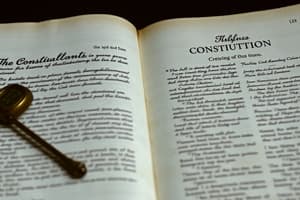Podcast
Questions and Answers
What are the 3 inherent powers of the State?
What are the 3 inherent powers of the State?
- Legislative, Executive, Judicial
- Senate, Supreme Court, Congress
- The Legislative, The Senate, The Supreme Court
- Police Power, Power of Eminent Domain, Power of Taxation (correct)
Which foundation of the nation is recognized by the State?
Which foundation of the nation is recognized by the State?
- Municipality
- Community
- Barangay
- Family (correct)
Which entity is considered a Constitutional Commission?
Which entity is considered a Constitutional Commission?
- Philippine Commission on Good Government
- Commission on Natural Resources
- Commission of Human Rights
- Civil Service Commission (correct)
Which document states 'no person shall be deprived of life, liberty, or property without due process of law'?
Which document states 'no person shall be deprived of life, liberty, or property without due process of law'?
Which rights are provided for people by the government through legislation?
Which rights are provided for people by the government through legislation?
Is it true that every person is entitled to equal rights?
Is it true that every person is entitled to equal rights?
Who appoints the judges of lower courts?
Who appoints the judges of lower courts?
If the President-Elect dies before inauguration, who shall become president?
If the President-Elect dies before inauguration, who shall become president?
Flashcards are hidden until you start studying
Study Notes
Philippine Constitution
- The 1935 Constitution was written to ensure the USA would grant Philippine Independence.
- President Marcos' Proclamation No. 1102 ratified the 1973 Constitution on December 1972.
- Former President Marcos' process of ratifying the 1973 Constitution was questioned by Teodoro Locsin, who believed it was never ratified.
- The concepts of "Constitution" and "Constitutionalism" are interchangeably used.
Key Concepts
- The Bill of Rights is found in Article III of the 1987 Constitution.
- A judge may issue a search warrant or warrant of arrest.
- The right to privacy is not violated if there is a lawful order of the court, hot pursuit, or public safety or order requires it.
Government Structure
- Senators have a term of office of six years and shall not serve for more than two consecutive terms.
- Party-list representatives shall constitute twenty percent of the total number of representatives, including those under the party list.
Constitutional History
- The 1899 Constitution was approved by Aguinaldo on December 23 and promulgated on January 21.
- Borgeaud described a Constitution as a fundamental law from which the government of a state is organized.
State Powers and Family
- The three inherent powers of the State are police power, power of eminent domain, and power of taxation.
- The State recognizes the family as the foundation of the nation.
Constitutional Commissions
- The Civil Service Commission is a Constitutional Commission.
Constitutional Rights
- The Bill of Rights states that no person shall be deprived of life, liberty, or property without due process of law, nor any person be denied the equal protection of the laws.
- Statutory rights are rights provided for people by the government through legislation.
- Every person is entitled to equal rights.
Studying That Suits You
Use AI to generate personalized quizzes and flashcards to suit your learning preferences.



